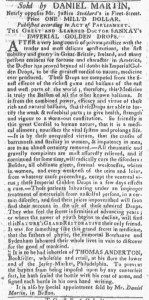What was advertised in a colonial American newspaper 250 years ago today?

“It is also by special appointment sold by Mr. Daniel Martin, in Boston.”
Many patent medicines were widely available from apothecaries, shopkeepers, and even printers throughout the American colonies. From New England to Georgia, newspaper advertisements listed popular remedies, including Stoughton’s Elixir, Bateman’s Drops, and Hooper’s Pills. Consumers recognized the various brands and understood which symptoms each supposedly relieved without encountering additional information in the advertisements.
Other patent medicines, however, were not as widely available. Such was the case for the “GREAT AND LEARNED DOCTOR SANXAY’s IMPERIAL GOLDEN DROPS,” the subject of a lengthy advertisement in the June 3, 1771, edition of the Boston-Gazette. The Imperial Golden Drops required greater elaboration since they were not as widely familiar to consumers as many other medicines. The advertisement explained that the Imperial Golden Drops “are composed from the finest essence of the richest gums and balsams of the east and west parts of the world; therefore, this Medicine is truly the Balsam of all the other known balsams.” The advertisement claimed that this restorative could “fortify the weak & enfeebled parts; to give health, strength and vigour to a worn-out constitution.” The Imperial Golden Drops aided with “rheumatic and gravelly complaints” as well as “barrenness and sterility in women, & impotency in men.”
Consumers could not acquire this nostrum in just any shop in the colonies. Instead, it was exclusively available from a select few vendors. Thomas Anderton, a bookseller in Philadelphia, began advertising the Imperial Golden Drops in January 1771. According to his advertisement in the January 31 edition of the Pennsylvania Gazette, Anderton supplied customers to the south via “WILLIAM DIELEY, Post-rider, from Philadelphia to Virginia” and “Mr. BALL, the sign of the White Horse, in Annapolis.” Several months later, Daniel Martin supplied the Imperial Golden Drops to consumers in Boston. Martin reprinted Anderton’s advertisement that first ran in the Pennsylvania Chronicle on February 18, adding an additional headline and a final note. The headline proclaimed, “Sold by DANIEL MARTIN,” and listed the price before transitioning to the copy originally printed in other newspapers. That copy included a short paragraph identifying Anderton as the supplier. It also warned against counterfeits, noting that Anderton “hath sealed the bottle with his coat of arms, and signed each bottle in his own hand writing.” For local customers, Martin added a brief note: “It is also by special appointment sold by Mr. Daniel Martin, in Boston.”
Apothecaries and other retailers in Boston marketed a variety of patent medicines found in shops throughout the colonies, but Martin provided access to an elixir not stocked elsewhere in the city. His “special appointment” to sell the Imperial Golden Drops in New England made him the sole vendor of a patent medicine billed as “the greatest … medicine ever produced.” Martin likely hoped that such exclusivity generated demand and added value to the unique product he hawked to prospective patients in Boston and surrounding towns.
